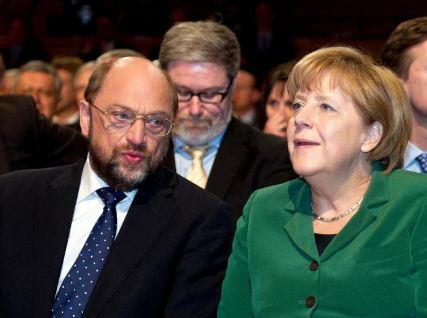Germany Gets a Grand Coalition
The SPD members voted by a two-thirds majority for their party’s entry into a renewed grand coalition. The acting Social Democrats (SPD) party leader Olaf Scholz came out and said: “We now have clarity: The SPD will enter the next federal government.” The SPD had no choice. The polls showed if they returned and put it to an election, they would lose to the rising right-wing. Germany will move into a grand coalition but it truly lacks the majority support of the German people. This means that political unrest in Germany will continue to rise.
Chancellor Angela Merkel finally reached a deal this past Wednesday to form a new German grand coalition government by handing the powerful finance ministry to the country’s main center-left party SPD in an agreement aimed at ending months of political gridlock. Both the CDU and SPD realized that if they failed, both would lose seats to the rising AfD. Merkel’s conservative Christian Democratic Union (CDU), its Bavaria-only sister, the Christian Social Union, and the center-left SPD agreed to a 177-page deal that leads off with the promise of “a new awakening for Europe.”
Germany has already broken its post-World War II record for the longest time in its latest election on Sept. 24 to the swearing-in of a new government. That is still at least several weeks away. Merkel has been leading a caretaker government, which has not been in any position to play any significant role in the debate on the fate of the EU going forward. That spotlight has been taken by France’s President Emmanuel Macron who seems to enjoy his newfound power.
Schulz’s has taken a course in recent months that simply undermined his authority. On election night, Schulz vowed to take the party into opposition against the CDU. He reversed course in November after Merkel’s efforts to build a coalition with two smaller parties collapsed. Merkel needed only the approval of a party congress of her CDU which seems to do whatever she tells them to do. The Social Democrats are set to get the foreign, labor and finance ministries to run. The finance ministry is the major prize, for it was held by Merkel’s CDU for the past eight years. This has been a major influential position given Germany’s status as the eurozone’s biggest economy. The interior ministry, also held by the CDU, would go to Bavaria’s CSU, which has pushed hard to curb the number of migrants entering Germany.

